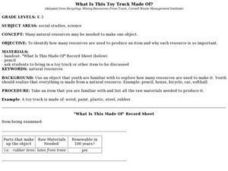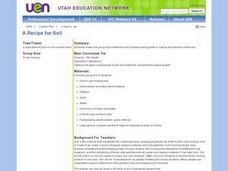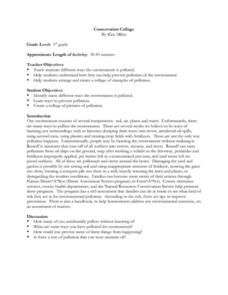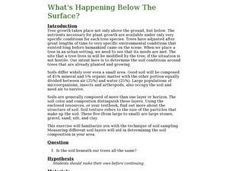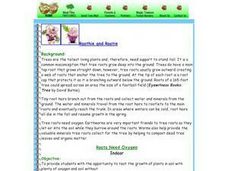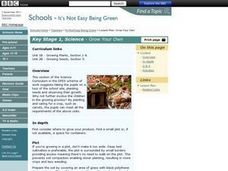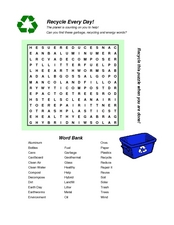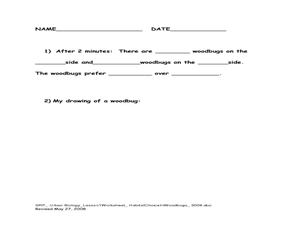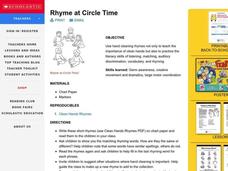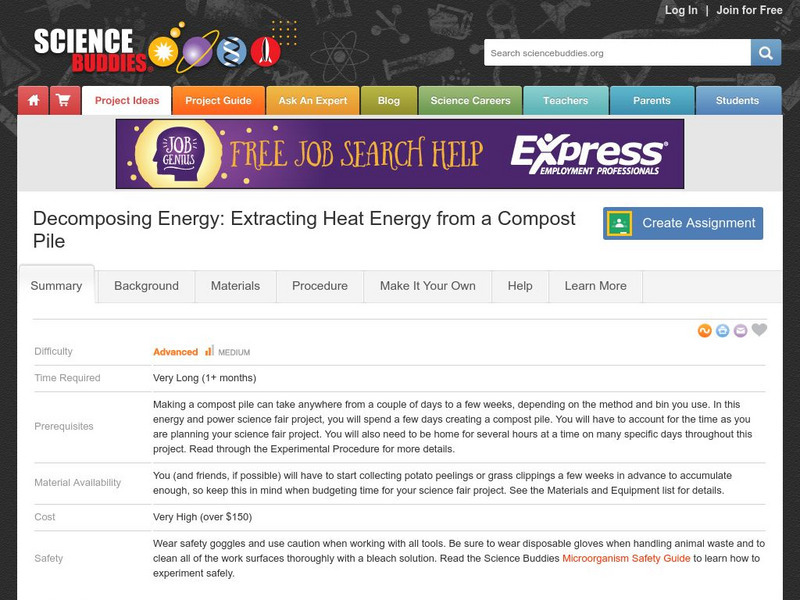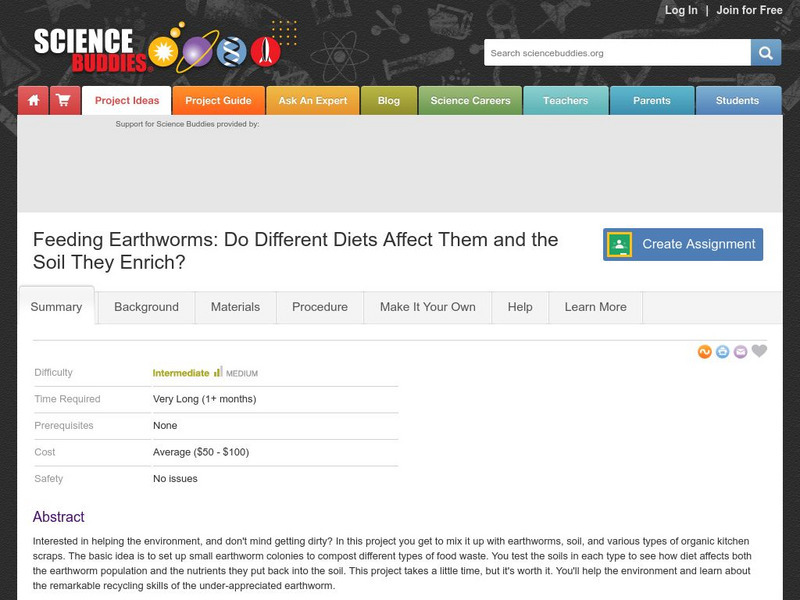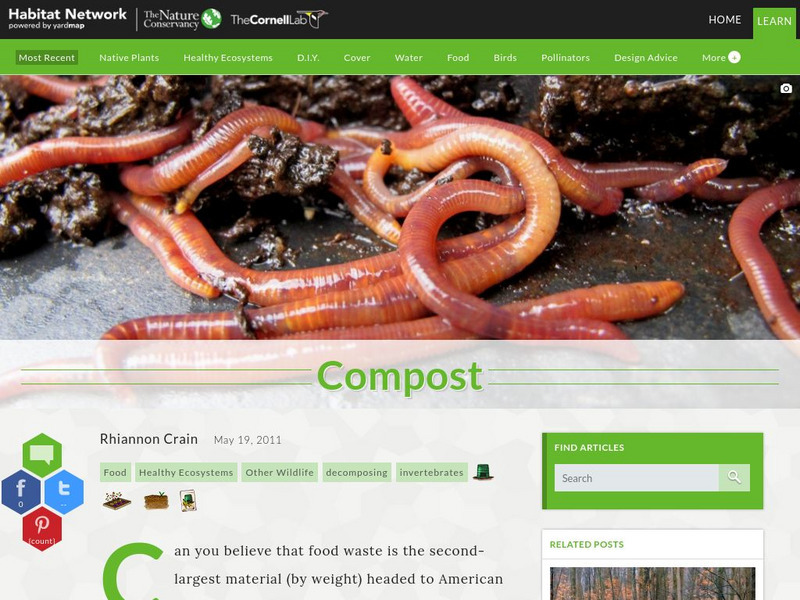Curated OER
Trash or Treasure?
Students discover why, how, and where they should recycle or reuse what they throw away.
Curated OER
What is This Toy Truck Made Of?
Students explore how many resources are used to make objects. This exploration should lead to the discovery that everything is made from a natural resource after listing all the raw materials needed to produce it.
Curated OER
A Recipe for Soil
Fourth graders use local materials such as leaves and other plant matter; sand and pebbles to make soil. They plant seeds in the manufactured soil and in natural soil and then observe and record the results.
Curated OER
Conservation Collage
Students identify many different ways the environment is polluted, and determine ways to prevent pollution. They create a collage of pictures describing how the earth becomes polluted.
Curated OER
What's Happening Below The Surface?
Students determine the soil composition of soil layers in their area. They collect soil samples, calculate the percentage soil water content, analyze data, and evaluate each site for future tree growth.
Curated OER
Roots Need Oxygen
Students investigate the growth of plants in soil with oxygen and soil without oxygen. They discuss what roots need to survive, and chart the growth of two plants to analyze the difference between plain soil and soil with two earthworms.
Curated OER
Odyssey of Life, Part II-The Unknown World
Students complete an experiment in which they observe different natural sample in which they uncover the microbial world. They complete a two part worksheet that accompanies the lesson.
Curated OER
Save the Planet!
Third graders explore the Recycle City Web site. They examine ways to save the environment. They write a short interview between a news reporter and an environmental expert. They practice acting out their news report.
Curated OER
Grow Your Own
Learners study the growth and care of plants. They take tour of their school site and plant seeds to observe their growth. Afterward, they answer questions about the origin and value of their plants.
Curated OER
Recycle Every Day
In this recycling instructional activity, 3rd graders complete a word search. Students locate 36 words in the puzzle, all associated with reuse of various items.
Curated OER
Gardening with Your Students
By growing a class or school garden you can teach students about the environment, the life cycle of a plant, and healthy eating.
Curated OER
Habitat Choice in Woodbugs
Students investigate woodbugs. In this scientific investigation lesson, students explore the steps scientists take when conducting an investigation using live specimens. Students explore habitat preferences for woodbugs in various...
PBS
Twirling in the Breeze
Blow classes away with a hands-on lesson investigating wind speed. Learners use common materials to design and construct anemometers. They then test their anemometers and collect data on the wind speed created by a fan.
Curated OER
Tag the Germs
Students review what happens when they wipe germs off their hands with a wet wipe. Next, they play a game of tag in which some students are germs and others are wipes. They move around while music plays, stop when it stops, and the wipes...
Curated OER
Rhyme at Circle Time
Students study the importance of clean hands and practice the literacy skills of listening, matching, auditory discrimination, vocabulary, and rhyming. They illustrate their rhyme chart with drawings or photos taken doing the different...
Cornell University
Cornell University: Cornell Composting: The Science and Engineering Composting Composting
This clickable web page is like an outline that comprehensively covers the science of composting. Each link takes you to another section of notes.
Science Buddies
Science Buddies: Composting and Vermiculture
Make your own fertile soil using kitchen scraps, manure, leaves, grass clippings, and other compostable materials. Which materials make the best compost?
Cornell University
Cornell University: Cornell Composting: Composting in Schools
Composting in schools, what's the value in it? Not only will it reduce your waste, it is a great science project. Try it out and learn how the earth "feeds" itself.
Science Buddies
Science Buddies: Project Ideas: Decomposing Energy: Heat Energy From Compost
In this energy and power science fair project, the student will calculate the heat energy produced by an active compost pile, surrounding a tin can filled with water. The Science Buddies project ideas are set up consistently beginning...
Science Buddies
Science Buddies: How Diets Affect Earthworms and the Soil They Enrich
In this environment-oriented experiment, you will mix it up with earthworms, soil, and various types of organic kitchen scraps. The basic idea is to set up small earthworm colonies to compost different types of food waste. You test the...
Other
Paul's Garden World: The Science of Composting
Very thorough description of different organisms involved in decomposing organic material through composting. Includes actinomycetes, bacteria, fungi, and a variety of macro-organisms which also function as decomposers. Also discusses...
Cornell Lab of Ornithology
Habitat Network: Compost
Are people wasting yard waste? Why not turn a small corner of a backyard into a nutrient source that not only replenishes the soil but supports the base of the bird food pyramid.
Science Buddies
Science Buddies: The Big Dig
Even though many cities have recycling programs, a lot of trash still ends up in the dump. Find out which materials will break down and which materials won't. Will the results of this experiment change which products you often buy?
Texas Commission on Environmental Quality
Tceq: Lesson Plans & Resources for Teaching Environmental Sciences [Pdf]
A large collection of lesson plans on environmental topics. The lessons are broken up into the broad categories of air, water, and waste, and look at issues around quality, pollution, conservation, and recycling. There are activities for...



